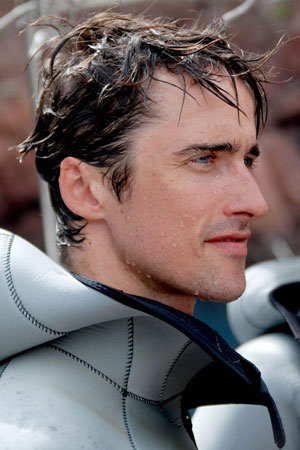Interview with new Commission advisor Pierre-Yves Cousteau

date: 19/12/2012
Pierre-Yves, after being appointed as an advisor to Commissioner Maria Damanaki, you will have realised one of her main goals is sustainability. Which aspects of sustainability are you particularly looking forward to advising us on?
It is an honor to have the opportunity to advise Commissioner Maria Damanaki. Aspects which are dearest to me are the establishment of Marine Protected Areas, which represent one of the most efficient known solutions to today's global collapse of fisheries while providing important opportunities for tourism and creating jobs; the protection and quantification of Posidonia oceanica, the Mediterranean seagrass, which we are just beginning to discover is one of the world's most efficient carbon traps in addition to being a fish hatchery, an oxygen producer, a natural barrier against tidal waves and a water-column cleaner; and finally on participative science and community projects, to involve the laymen in the study and protection of marine life, through active participation and through sustainable decisions in everyday consumption.
Pierre-Yves, your work with Cousteau Divers and the IUCN, the International Union for Conservation of Nature, has seen you travel around the globe. How do our European seas such as the Mediterranean compare? What can we learn from foreign waters and what should we be proud of here?
The Mediterranean is one of the most polluted, over-fished and damaged seas in the world. Because it is such a closed sea, affected by dozens of countries and their rivers, tourists, fishermen, industry, land reclamations, etc... it can serve as a model of what will happen to the rest of the world's oceans. We must find solutions to protect the Mediterranean, which has been the cradle of mankind and sustained it for millennia. When compared to US coastal waters for instance, we can be proud of having banned SCUBA sport fishing. We can be proud to have many wonderful endemic species, including the amazing Mediterranean seagrass. We can be proud of our marine protected areas. However, if we look at the Earth's last true marine sanctuaries, the places that have never been over-exploited to the point that MPAs became a life-jacket, we can see that something is missing in the Med: a large-scale, bold, international marine conservation project.
Your organisation is involved participative science. How does this work in practice, what is its purpose and what benefits can be derived from it?
Participative science involves recreational users of the sea in reporting simple observations. Cousteau Divers' dream is to collect enough information on a daily basis to have a near real-time diagnosis of the health of the oceans worldwide, and to react to subsequently-generated environmental alerts with in-depth scientific expeditions to determine the causes and propose solutions to the observed problems. Acting, in fact, like an immune system for the oceans.
In principle, participative science can collect quantities of data that no scientific research could dream of ever collecting with reasonable budgets. The quality of this data is the drawback and we have been tweaking this quality/ quantity trade-off in order to keep participants entertained while maintaining reasonable data quality.
There are obviously many factors which are contributing to damaging marine life. Whilst your work involves advising the Commission, how would you advise consumers and citizens to make a difference?
I do not believe in blaming and pointing fingers at the consumer. Everyone makes the logical assumption that if something is on the market, it can be bought without disastrous consequences for all of mankind. I think the effort must come from the companies and governments to supervise the quality (in terms of health) and sustainability of what is sold. But the consumer has perhaps more power in the supermarket than in the voting booth. By choosing deliberately to boycott unsustainable products, we can have a true impact on what the companies offer. It troubles me however, that the consumer should be the "chaperon" of the companies, when each of us has limited access to the information about which product is sustainable and which one is not, and limited time to worry about it.
The Commissioner has just produced her half-term report, do you think Europe has what it takes to lead the way in creating a sustainable maritime environment?
The Commissioner is dedicated to sustainability and passionate about reversing the trend that is leading global fisheries into the abyss. Creating a sustainable maritime environment will require this dedication and vision. It will also require a lot of awareness-raising and information to the population within all European countries, because lasting change must come both from top-down and from bottom-up. Why is there so little information today on what products are sustainable and which ones are not? We need to know the truth in order to make the right decisions. Leaving a sustainable world for future generations is going to take a lot of effort, and must involve everyone. It will also have to make economic sense for everyone, which can be achieved when we shift our perception from very short-term to medium and long-term.
Finally an easy one! Pierre-Yves, what is your favourite fish and why?
I never had a big taste for seafood, so I have no merit in my abstinence from eating threatened fish.
